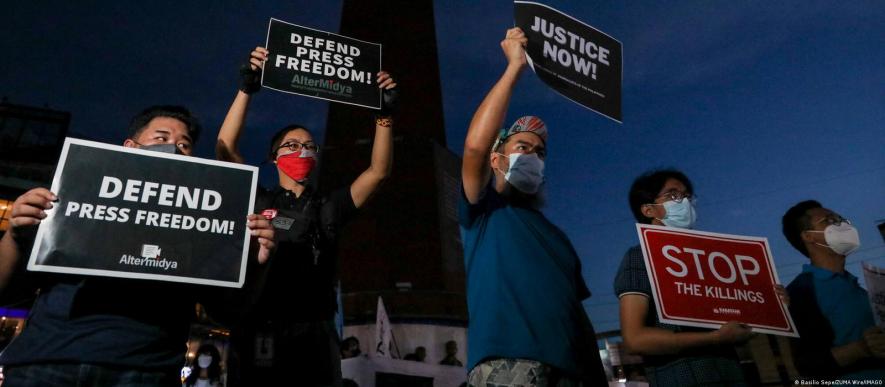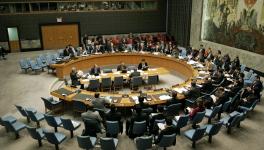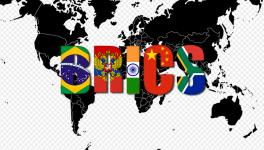Student Reporters Threatened, Harassed in The Philippines

Student journalist in the Philippines are under mounting pressure — last month, police were deployed to two campuses in the north of the country after student journalists reported receiving threats of death and physical harm.
Polynne Dira, former editor of the Philippine Collegian, the official publication of the University of the Philippines (UP) Diliman, told DW that she had faced online attacks before. The experience has left her rattled.
"I'm just at home. What if someone on a motorcycle passed by to shoot at me?" she says. "Accountability is hard. Most online threats are by trolls who have a hidden or fake identity."
Belle Mira, associate editor for the student publication of UP Baguio, told DW that she had a bad experience involving police officers who surrounded and blocked her when she was covering a protest.
"From then on, I get really scared whenever I see the police," she told DW. "My media ID will not protect me. The police have no respect even for us campus journalists."
Campus publications have played an important role in the Philippines by exposing issues marginalized or ignored by the mainstream press. Student newspapers also have an advantage of not being beholden to corporate interests that can sway or influence coverage of larger news outlets.
Police visits slammed by reporters
Earlier this month, two masked assailants rode up to the car driven by hard-hitting radio journalist Percival Mabasa and gunned down the reporter who was on his way home.
Mabasa, better known on-air as Percy Lapid, thus became the latest of nearly 200 journalists who were killed in the Philippines since 1986, according to the figures provided by the National Union of Journalists of the Philippines (NUJP).
The shock caused by the killing was compounded by police making unannounced visits to media workers. The authorities said that the officers were there to ask journalists if they were facing threats. But NUJP general secretary Len Olea said that sudden police visits, including at least one happening at a reporters home, caused even more anxiety.
Interior Secretary Benhur Abalos eventually apologized for creating "panic" but stressed that the police visits were done in good faith.
RSF says clampdown against students 'alarming'
International press freedom watchdog Reporters Without Borders (RSF) has consistently ranked the Philippines as one of the most dangerous countries in the world to be a journalist.
Daniel Bastard, RSF Asia-Pacific director, said that the crackdown on campus journalists in the Philippines is "alarming."
"Even students are now being given a taste of what they will have to bear if they want to become professional journalists," Bastard told DW, pointing to the ongoing case against Nobel Peace prize laureate Maria Ressa.
"In the end, this is the same spectrum: it starts with violent threats against students and campus journalists, and ends with the potential life jail sentence against Maria Ressa or the recent murder of Percy Lapid," he said.
More threats, less funding
"Student publications and organizations are constantly subjected to internet intimidation, article removal, unwanted communication, and even death threats," Melanie Feranil, spokesperson of the College Editors Guild of the Philippines (CEGP) told DW.
The CEGP, a nationwide alliance of campus publications, recently conducted a survey on "red-tagging" — a decades-old practice in the Philippines that sees police, government officials or government allies labeling individuals and organizations as supporters of communism and a pro-communist insurgency. This is usually followed by threats or violence.
The CEGP found that nearly all 30 of the campus publications who participated in the survey had their social media accounts red-tagged.
Also, the CEGP revealed that nearly 200 student publications across the country are on the verge of losing funding because of a law passed in 2016 under Rodrigo Duterte. Under this law, academic institutions do not have to charge student publication fees in the cost of tuition.
The CEGP is advocating for the passage of the Campus Press Freedom Bill which will repeal the current legislation.
"With all the red-tagging, harassment and intimidation that campus journalists are facing, the government must do something to protect and safeguard the rights of student journalists and campus publications," said Feranil.
'It's better to be paranoid'
Campus journalists say that the biggest burden is the mental health toll.
Cristina Chi, former editor-in-chief of a UP campus publication, was shocked to see her photo included in a collage of people tagged as terrorists. The collage was sent to the publication's Facebook page along with a death threat.
"The particular picture used wasn't public to all, so I wonder how they got it. That incident spooked me a lot because it confirmed to me that there are really people monitoring the accounts of UP students," Chi said.
Chi immediately deactivated her social media account and shortened her byline to make it more difficult to identify her coverage, but still, it took a toll on her emotionally and mentally.
"I became wary of talking to strangers who look at me for more than 3 seconds. I've heard so many incidents of human rights defenders who first received death threats and then were later killed. It's better to be paranoid rather than dead," she told DW.
Edited by: Darko Janjevic
Get the latest reports & analysis with people's perspective on Protests, movements & deep analytical videos, discussions of the current affairs in your Telegram app. Subscribe to NewsClick's Telegram channel & get Real-Time updates on stories, as they get published on our website.
























